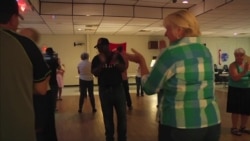Many veterans struggle with Post Traumatic Stress Disorder, or PTSD, after returning home from war. Symptoms of this invisible wound may manifest as panic attacks, flashbacks of horrible memories or nightmares.
People with PTSD may also have problems concentrating and sleeping. They may suddenly get angry or develop unhealthy habits such as smoking, drinking and doing drugs.
Some of them are dancing their symptoms away.
No worries, no nightmares
More than two dozen veterans gather once a week in Louisville, Kentucky, for a dance session. They’re clapping, moving to the music and taking a break from the overwhelming symptoms of PTSD.
These dance-as-therapy sessions are organized by Deborah Denenfeld.
“You know you get moving, the endorphins go up, and you feel good,” she said. “And they tell me that they continue to feel good even after they go home and maybe into the next day and the next day.”
According to the U.S. Veterans Administration, between 10 and 20 percent of war veterans are living with PTSD. Roosevelt Smith, who served in the Gulf War, is one of them and says dancing helps.
“It’s a way of calming yourself, an outlet so to speak,” he said. “We have a lot of things that we do as far as prescription drugs, but this right here is the best prescription that I’ve had as far as dance, no side effects. Actually the only thing that will happen to you is if you smile too much, you know your cheeks may, uh, you get sore and you get stuck, but it’s good to be smiling.”
Dance as therapy
Denenfeld developed the “Dancing Well” program for veterans with PTSD in 2013. The group sessions are kept small, usually less than 30 people. Each session runs for 10 weeks. The lights are kept low and the music is cheery without heavy beats.
“We do lower the lights for people who have traumatic brain injuries,” Denenfeld said. “We watch the volume of the music, some people are very sensitive to volumes and noise.”
War veteran Darlene Messler says following the music helps her focus on herself and live in the moment.
“It brings me back to me, it focuses on myself and that I’m having fun, which before when I was always worried about what other people were thinking or did I do this right or stuff like that,” she said. “When I’m here, I don’t have to worry about that I just have fun, we’re all just here as a family and just having fun.”
Denenfeld’s next step is to train volunteer leaders so more classes can be offered to help veterans fight PTSD.













